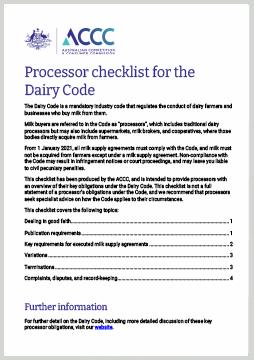On this page
About the dairy code
The Dairy Code of Conduct came into effect on 1 January 2020.
Since 1 January 2021, all milk must be purchased under a milk supply agreement and all milk supply agreements must comply the code.
The code aims to promote fair trading in the dairy industry by imposing minimum standards of conduct on farmers and processors. These minimum standards of conduct:
- account for the imbalance in bargaining power between dairy farmers and processors, and
- address longstanding industry practices which were seen to be unfair or had the effect of deterring farmers from responding to market signals.
The code also aims to improve certainty and transparency between farmers and processors, by:
- requiring the parties to have a milk supply agreement in place, and
- requiring processors to publish all their standard form milk supply agreements on their website by 2 pm on 1 June each year.
The ACCC is responsible for enforcing the code and has the power to investigate and take enforcement action. Breaches of the code may result in civil penalties.
Other rights and responsibilities for farmers and processors
In addition to the code, farmers and processors may also have rights and responsibilities under the under the Competition and Consumer Act 2010 and the Australian Consumer Law.
If you’re unsure about your rights and responsibilities under the code or the Competition and Consumer Act 2010, we strongly recommend you seek independent legal advice.
Meaning of farmer and processor
Under the code, a farmer is a person that produces or may produce milk.
The code defines a processor as a corporation that purchases or may purchase milk from a farmer, whether or not the corporation processes that milk. This definition aims to capture the first purchaser of a farmer’s milk, which may include:
- manufacturers of dairy products
- supermarkets
- retailers
- cooperatives
- collective bargaining groups
- milk brokers.
Small businesses exemption
Regardless of their size, all processors and farmers must act in good faith at all times.
However, the rest of the code does not apply to a processor that is a small business entity.
The code uses the definition of ‘small business entity’ as set out in the Income Tax Assessment Act 1997. The Australian Tax Office (ATO) provides several methods for determining if an entity is considered a small business entity.
Example of a small business entity
On 1 May 2023, Colac Holsteins Pty Ltd is considering whether it will need to publish standard form milk supply agreements on its website on 1 June 2023.
Under ATO Method 1, if Colac Holstein’s turnover during the previous financial year (FY2021-22) was less than $10 million, it will likely be considered a small business entity for the upcoming 2023-24 dairy season.
If Colac Holsteins’ annual turnover exceeds $10 million during the 2023-24 financial year, any new or extended milk supply agreements will need to comply with the code.
Visit the Australian Taxation Office for more information on how to work out if you’re a small business entity.
Processor checklist
Use our processor checklist to help you understand your rights and obligations under the code.




